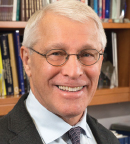In 2012–2013, members of the President’s Cancer Panel (prescancerpanel.cancer.gov) focused their efforts on accelerating widespread acceptance of and use of approved human papillomavirus (HPV) vaccines to prevent cancer. The topic is important, because HPVs cause most cases of cervical cancer and large proportions of vaginal, vulvar, anal, penile, and oropharyngeal cancers, as well as genital warts and recurrent respiratory papillomatosis.1
When our report, Accelerating HPV Vaccine Uptake, was released in 2014, two safe, effective vaccines had been approved by the U.S. Food and Drug Administration (FDA) and recommended by the Advisory Committee on Immunization Practices. A third HPV vaccine (9-valent) was FDA approved and recommended by the Advisory Committee on Immunization Practices in 2015.2 A statement from ASCO—recently published by Bailey and colleagues3 and summarized in this issue of The ASCO Post—emphasized that the approved vaccines demonstrate immunogenicity with an impressively low incidence of adverse effects, even 6 years after vaccination.

Barbara K. Rimer, DrPH
In spite of endorsements by the Advisory Committee on Immunization Practices, Centers for Disease Control and Prevention (CDC), World Health Organization, and a host of other organizations,3 U.S. rates of HPV vaccine administration were and continue to be below those seen for other adolescent vaccines and below rates in many other countries where there have been concerted country- or region-wide approaches to increase vaccination uptake. Completion of the three-dose series in the United States was 39.7% for girls and 21.6% for males in 2014; initiation rates are higher than completion rates, because many adolescents start but do not complete the three-dose series.4 The summary statistics do not convey the important regional variation seen in United States. HPV vaccination rates, where low vaccination and high cervical cancer rates converge.5
The CDC has estimated that increasing HPV vaccination rates from current levels to 80% would prevent an additional 53,000 future cervical cancer cases among girls who now are 12 years old or younger over the course of their lifetimes.6 With three approved vaccines for HPV vaccination, the means to prevent multiple cancers is at hand. But while uptake has improved slightly since initial approval of the vaccines, current rates are insufficient to achieve the impressive cancer prevention targets that would be possible if rates of HPV vaccination were to approach 80%—similar to the uptake for other adolescent vaccines.1 ASCO’s recommendations and commitment to increasing rates of HPV vaccination could make a positive difference.
Power of Physician Recommendations
The report by the President’s Cancer Panel includes four goals with associated objectives. Among them are improving parents’, adolescents’, and caregivers’ acceptance of HPV vaccines; increasing access to vaccines (which involves overcoming remaining cost barriers and encouraging delivery models that facilitate adolescent vaccination); and conducting research to answer key questions, such as how many vaccine doses are required for efficacy. Two doses would be preferable to three in terms of the complexity of compliance, and therefore, the question needs to be one of the highest research priorities for the National Cancer Institute.

Abby B. Sandler, PhD
As the President’s Cancer Panel, CDC, and now ASCO have emphasized, a successful strategy to increase the uptake of HPV vaccines must reduce the missed opportunities for vaccine administration that are rampant today. ASCO’s recommendations are consistent with other credible reports and add the weight of this important organization. Multiple studies have shown that when physicians and other health-care providers strongly recommend to parents that they have their sons and daughters vaccinated to protect against HPV and thus prevent multiple cancer types, most agree to it.7,8
As the ASCO statement summarized, physicians identify many reasons for not making these recommendations, such as costs to their practices, confusion about the age at which vaccination should occur, lack of proper office systems for recall and reminders, and discomfort with a topic that includes discussion of sexual transmission.3 As a result, many vaccine-eligible adolescents do not receive HPV vaccines during visits with their health-care providers, despite the fact that other adolescent vaccines are administered during these visits. Every time that occurs, it is a missed clinical opportunity to protect an adolescent/young adult from cancer.1,9
The encouraging lesson from past research is that the power of physicians’ strong, positive messages regarding cancer prevention has been shown repeatedly to increase uptake of recommended prevention behaviors and other strategies, and HPV vaccination is cancer prevention.7 As articulated in Accelerating HPV Vaccine Uptake as well as in the recent statement from ASCO, communication should be comprehensive, evidence-based, and targeted to multiple groups, such as physicians, pharmacists, dentists, school nurses and leaders, parents and other caregivers, and adolescents themselves.1,3
ASCO’s Key Role
While oncologists do not treat the majority of adolescents in the United States and, as Bailey et al noted, may not be direct providers of services to adolescents, they often are leaders in their communities who can use their credible voices to advocate for increased HPV vaccination.3 They can make themselves available as advisors to health departments and school districts regarding recommendations to reduce cancer in particular geographic areas. They may be asked to weigh in on proposed community programs, such as school-based vaccination programs, and they can be credible voices on policy. They can collaborate and partner with cancer prevention and population science programs in comprehensive cancer centers and schools of public health. Regardless of the audience, oncologists and ASCO representatives should convey the unequivocal support for widespread HPV vaccination that is clearly advocated by the organization.

Owen N. Witte, MD
We applaud ASCO’s commitment to “lessen the burden of cancer for our patients, their families, and our communities and the recognition that it places us in a position of influence. We should use interactions with our patients, primary care colleagues, and health-care systems to raise awareness of HPV-related cancers and the role of vaccination in preventing them.”3
With its more than 40,000 members, ASCO’s strong, evidence-based statement about the importance of HPV vaccination adds another influential group of voices to the goal of increasing uptake. It is appropriate that ASCO is providing strong leadership on the issue, because a strong message is needed. HPV vaccination is cancer prevention. Failure to move the needle on HPV vaccination represents hundreds of thousands of lives lost in the United States and around the world. ■
Disclosure: Drs. Rimer, Sandler, and Witte reported no potential conflicts of interest.
Dr. Rimer is Dean and Alumni Distinguished Professor at the Gillings School of Global Public Health, University of North Carolina at Chapel Hill, and Chair of the President’s Cancer Panel. Dr. Sandler is Executive Secretary of the President’s Cancer Panel and Special Assistant to the Director, NCI Center for Cancer Research, on the Rare Tumors Initiative. Dr. Witte is Distinguished Professor of Microbiology, Immunology, and Molecular Genetics, David Geffen School of Medicine; Director, Eli and Edythe Broad Center of Regenerative Medicine and Stem Cell Research, University of California, Los Angeles; investigator, Howard Hughes Medical Institute; and member of the President’s Cancer Panel.
References
2. Petrosky E, Bocchini Jr JA, Hariri S, et al: Use of 9-valent human papillomavirus (HPV) vaccine: Updated HPV vaccination recommendations of the Advisory Committee on Immunization Practices. MMWR Morbid Mortal Wkly Rep 64:300-304, 2015.
3. Bailey HH, Chuang LT, DuPont NC, et al: American Society of Clinical Oncology statement: Human papillomavirus vaccination for cancer prevention. J Clin Oncol 34:1803-1812, 2016.
4. Stokley S, Jeyarajah J, Yankey D, et al: Human papillomavirus vaccination coverage among adolescents, 2007–2013, and postlicensure vaccine safety monitoring, 2006–2014—United States. MMWR Morbid Mortal Wkly Rep 63:620-624, 2014.
5. Horner MJ, Altekruse SF, Zou Z, et al: U.S. geographic distribution of prevaccine era cervical cancer screening, incidence, stage, and mortality. Cancer Epidemiol Biomarkers Prev 20:591-599, 2011.
6. Stokley S, Curtis CR, Jeyarajah J, et al: Human papillomavirus vaccination coverage among adolescent girls, 2007-2012, and postlicensure vaccine safety monitoring, 2006-2013—United States. MMWR Morbid Mortal Wkly Rep 62:591-595, 2013.
7. Zolnierek KBH, DiMatteo MR: Physician communication and patient adherence to treatment: A meta-analysis. Med Care 47:826-834, 2009.
8. Reiter PL, Brewer NT, Gottlieb SL, et al: Parents’ health beliefs and HPV vaccination of their adolescent daughters. Soc Sci Med 69:475-480, 2009.
9. Moss JL, Gilkey MB, Reiter PL, et al: Trends in HPV initiation among adolescent females in North Carolina, 2008-2010. Cancer Epidemiol Biomarkers Prev 21:1913-1922, 2012.

